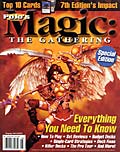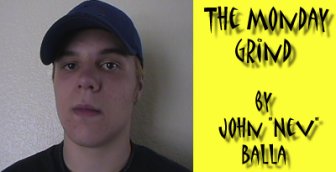 |
||||||||||||||||||||||
 |
 |
|||||||||||||||||||||
 |
 |
|||||||||||||||||||||
|
Cheating In Magic Cheating in Magic. It's a subject that has been talked about alot by many different people, shunned by some and utilized by others to gain an advantage. Magic gives people so many opprotunities to cheat, that some people are bound to abuse it. You can stack your deck, mana weave, draw extra cards, mark your deck, and various other things that will give you an edge not permitted normally. Normally, if you keep an eye on your opponent and his deck, as well as the manner that they are playing, it is pretty hard to let someone's cheating go unnoticed, however, due to the large amount of money involved in playing on the Pro Tour or Pro-level events, learning how to cheat well becomes a very alluring proposition. After all, why not take the risk of being suspended for 6 months, or even just a disqualification, when the reward can be thousands and thousands of dollars? This is the mindset that has lead many people into the habit of cheating during tournaments. This can be justified in some people's minds because luck is such a large part of being successful at Magic, that you need to gain some sort of advantage to consistently do well; I mean, how many times have you thought that the matchup was so in your favor, and you were such a better player than your opponent, but you got mana screwed and lost? Chances are that it had happened, and it is very frustrating, but does it warrant being dishonest and cheating? Regarded by many as one of the most notorious cheaters to ever play Magic, Mike Long has been caught on a number of advantages attempting to cheat, yet his penalties have been minimal to none. His first, and probably most well known attempt at it, was at the 1998 US Nationals, where he was caught with a Cadaverous Bloom, one of the key components of his Prosperous Bloom deck, in his lap. Kind of a coincidence that it, instead of a basic land or any other card, would fall into his lap, and he would just happen to not notice it there, but he was given the benefit of the doubt, and not given any penalty for it, and went on to get 2nd, and make the US National Team. The second most well known incident of him cheating I had the pleasure of witnessing, at Pro Tour Los Angeles 2000, where I was standing next to Shawn Reigner, when he noticed that Mike was shuffling in a peculiar manner, and notified a judge. The judges conferred and checked his deck, and after a while, determined that it was insufficiently randomized. Despite his reputation as a dishonest player, he still got to participate in Top 8 of the tournament, and received no suspension. Aside from his sketchy manner of playing, Mike Long is still respected as one of the most interesting players, and also one of the best players, to ever play Magic. The most recent case of cheating is more disputable than the likes of what Long has done. At Nationals last weekend, during the Top 8, Casey McCarrel was disqualified because his opponent, Brian Hegstad, had noticed McCarrel shuffling Hegstad's deck in a strange way. After he was given the deck back, he called a judge, and it was revealed that his top 11 cards were spells. The reason that this is strange is that McCarrel would have had to either look at Hegstad's cards while shuffling, then rearrange them, which is not easy at all with a table judge right next to you, or, Hegstad's deck would have had to been marked in a manner that Casey could even distinguish just from looking at the backs of his cards. This wasn't the only incident that McCarrel has been punished for a reason that might not have warranted it. At Pro Tour London, he was given a six month suspension for misrecording a match result slip. He had blamed it on jetlag, which is a more believable story than the ones that Long provided after he was accused of cheating. So why was McCarrel punished severely for two incidents that weren't even blatent cheating, and Long was given barely any penalty when it was obvious to most people that he was intentionally being dishonest? That is something we'll all wonder for a while. These pro players are role models to the less skilled players not yet able to play at the pro-level, so what kind of example is it setting when they have such a win-at-all-costs attitude that they would be willing to break the rules of the game just to get the opprotunity to win money? With the high stakes of professional level Magic, cheating will probably continue to run rampant, and set a bad example to the people that look up to those players as real "professionals".
|
Biography
|
||||||||||||||||||||

